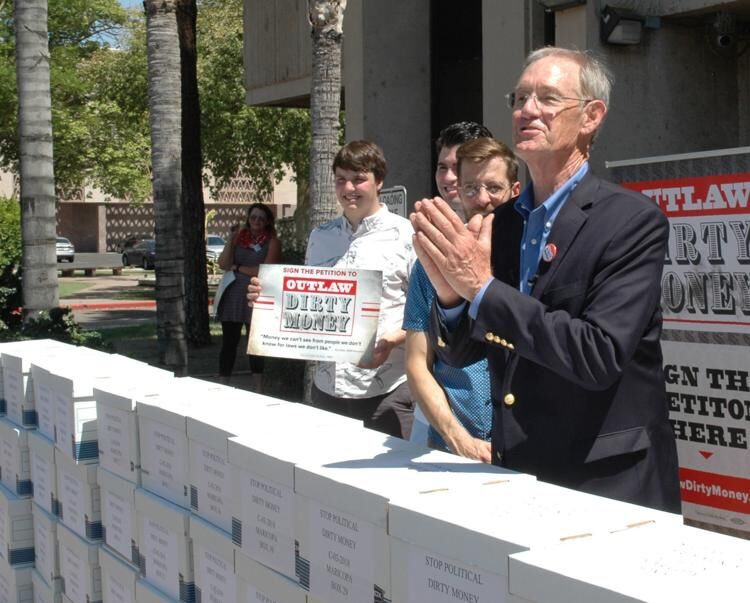Arizona’s majority knows what it wants.
Now the minority is looking for a way to stop it.
This is true already in the fight to force big campaign donors and their dark money out into the light.
It will also be increasingly true, during the coming year, as the debate over abortion rights moves toward a climactic vote in November 2024.
And the two issues — campaign finance transparency and abortion rights — will likely be linked as big money pours into the campaigns for and against a ballot initiative that would enshrine abortion rights in Arizona’s constitution.
But it’s unclear if the majority will rule, in the end, or if the American political trend toward minority rule will also take hold in Arizona.
On campaign-finance transparency, it’s starkly clear where Arizona voters stand. After failed efforts to get initiatives against dark money on the ballot in 2018 and 2020, last year we finally got the chance to consider Prop. 211, nicknamed the Stop Dark Money act.
We passed the act by a 72 percent to 28 percent margin — a landslide — but three lawsuits are attempting to disembowel it.
The act is designed to end the big-money anonymous spending that has bedeviled the state and country since the U.S. Supreme Court’s Citizens United decision in 2010. It requires the public identification of anyone donating at least $5,000 to an outside group engaged in influencing political races.
It also requires disclosures of the source of its money by any group spending $50,000 or more on statewide races or $25,000 or more on lower-level races.
The idea is to stop wealthy people or interest groups from, essentially, laundering campaign donations through groups that work independently of candidates’ campaigns but still try to affect the outcome of elections. When the Citizens United decision came down, the presumption was that reduced restrictions on donations would be paired with increased transparency, but it didn’t happen.
It’s not just Republicans who benefit from dark money; Democrats benefited more from dark money in the 2020 election than Republicans did. But it is conservatives who are pushing against disclosure in Arizona, I think because they depend on it more to boost minority viewpoints on key issues such as transparency and abortion.
There are three separate lawsuits attempting to throw the Stop Dark Money act out. Two of the suits allege the act violates free-speech rights, and the other suit, filed Monday by the state House and Senate’s leaders, says it unlawfully commandeers the Legislature’s power.
In other words, the suits argue either that big donors have a right to keep private their donations to groups trying to influence elections, despite voters’ clear wishes, or that we as voters have no right to the powers we exercised.
Memorably, the group Americans for Prosperity, in its federal lawsuit over the act, referred to the disclosure requirements as “governmental doxxing” of donors to nonprofit groups. This shows where they’re coming from because it turns what most of us consider a good thing — transparency — into a bad thing — doxxing, or revealing people’s identifying information against their will.
One of the first groups to sue over the Stop Dark Money act was the Center for Arizona Policy, the state’s top anti-abortion-rights group.
Its first attempt at a lawsuit, filed in December along with co-plaintiff the Arizona Free Enterprise Club, was thrown out in July. But now the two groups are back with a second attempt.
In the lawsuit, the center says it has a policy of keeping donor identifications private, and that the dark-money act will likely curtail donations.
“As a direct consequence of the implementation of the Act, donors to CAP will limit or eliminate their contributions to CAP rather than risk having their names, addresses, and employment information turned over to the government,” the lawsuit says.
“In addition, other donors to CAP may ‘opt out’ of having their contributions used for Campaign Media Spending, which will curtail CAP’s ability to engage in that activity.”
Now, it is fine to battle over which donations should be considered as contributing to a group’s campaign-influence efforts. This will be a difficult line to draw as the Arizona Citizens Clean Elections Commission establishes new rules.
But the latter point is a good thing, not a bad thing. If people don’t want their names disclosed, they should not be trying to influence campaigns with their money.
They will anyway, especially next year. Since voters in conservative Kansas rejected an effort to make abortion illegal a year ago, anti-abortion-rights groups have been grappling with the fact that in most states they represent a minority viewpoint. That became clearer yet Tuesday, when voters in Ohio clearly rejected a ballot issue intended to make it harder to codify abortion rights in the state's constitution.
In Arizona, as 2022 polling by the Public Religion Research Institute found, 62 percent of adults think that abortion should be legal in all or most cases. That’s typical, as the institute’s nationwide polling found. In 43 states, the majority of adults think abortion should be legal in all or most cases, and in 33 states at least 60% think so.
But majority opinion doesn’t always win the day in America, as we’ve seen repeatedly in presidential elections. Our big arguments over knotty issues are won as much in the signature-gathering efforts and subsequent lawsuits as they are at the ballot box.
Get your morning recap of today's local news and read the full stories here: http://tucne.ws/morning





